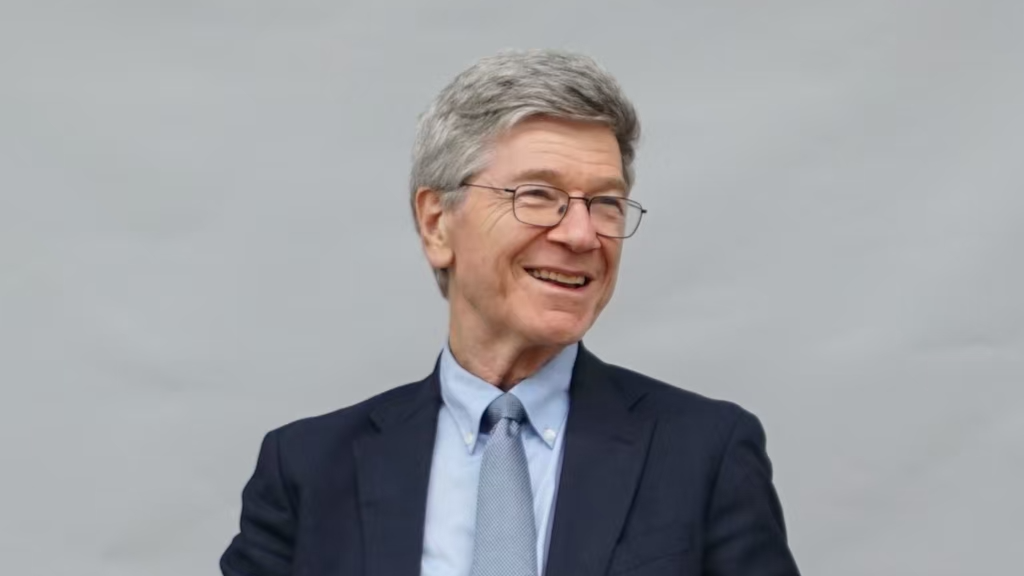
Renowned economist Jeffrey Sachs cast the Hong Kong Special Administrative Region as the epicenter of transformative economic and technological growth in the coming decades.
Speaking at the University of Hong Kong on Sunday, the Columbia University professor described the city as being at “the center of the next volcanic growth”. He highlighted the city’s pivotal role within the Guangdong-Hong Kong-Macao Greater Bay Area and the broader global economy.
Sachs, who is also president of the UN Sustainable Development Solutions Network, spoke as a “prophecy economist” at a Distinguished Lectures event, jointly held by the HKU’s Centre on Contemporary China and the World, the HKU Jockey Club Enterprise Sustainability Global Research Institute, and the HKU Business School.
READ MORE: Jeffrey Sachs: HK to play leadership role in global sustainable development
He expressed strong confidence in Hong Kong’s unique position: “What we have here offers not only an opportunity for your own prosperity and well-being over the coming generation, but … will shape the world in the way it needs to be transformed into an environmentally sustainable and highly productive future economy.”
Sachs envisions Hong Kong as a vibrant hub driving the green and digital economies globally, reinforced by regional collaboration, innovation, and strategic finance to meet global climate and economic challenges head-on.
He characterized the Greater Bay Area as “the single most dynamic part of the world economy”, and underlined its strategic advantages in green and digital technologies.
“What this region leads in is green technologies, photovoltaics, renewable energy, smart grids, digital connectivity, electric vehicles, battery supply chains, robotics, artificial intelligence” — all of which will dominate the global economy for “at least one generation, probably two”, Sachs said.
Addressing criticisms from Western observers who describe the Greater Bay Area’s production capacity as overcapacity, Sachs dismissed such concerns as expressions of “pure jealousy”. He said that “the world needs all of this” industrial output, particularly in sectors pivotal to climate change mitigation, like renewable energy.
He encouraged Hong Kong’s financial community to capitalize on this opportunity by facilitating investments that can amplify exports and global supply chains. “If the (nation’s) solar industry can export twice what it does right now — which it can — it is Hong Kong’s job to make that possible,” Sachs said.
During the first half of 2025, China’s solar capacity additions accounted for 67 percent of the global total. With strong expansion momentum, projections estimate China’s solar capacity could reach around 2,700 gigawatts by 2030.
Among China’s exports of solar products, the solar module accounts for the majority, despite a 5.2 percent decline in the first half of 2025. Exports of cells and wafers grew 76 percent and 26 percent year-on-year respectively.
READ MORE: Hong Kong registers 3.8% GDP growth in Q3, most since 2023
Sachs also highlighted the role of universities as leaders in regional cooperation and innovation. In collaboration with other Greater Bay Area cities, universities in Hong Kong, HKU included, are leading initiatives to integrate academic, business, and government efforts toward sustainable economic transformation.
Sachs was one of the US economists who introduced venture capital markets into China in the early 1980s. He marveled at China’s burgeoning innovation centers in the Greater Bay Area and Hangzhou, Zhejiang province, both of which now rival Silicon Valley in California.
Despite his optimistic outlook, Sachs cautioned against complacency. He warned of persistent geopolitical misunderstandings, particularly concerning US-China relations.
“China cannot be contained,” Sachs said. He called for moving beyond “confusion” and fostering genuine partnership between the two powers to avoid risks and promote stability.
Contact the writer at jessicachen@chinadailyhk.com


